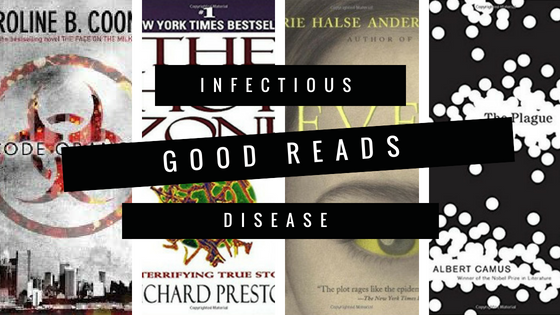|
In recognition of Children’s Book Week and Reading is Fun Week, we wanted to share some of our favorite infectious disease reads. Future epidemiologists, this list is for you.
Youth and Young Adults
Code Orange, by Caroline B. Cooney (F)
NYC teen Mitty Blake's whole life changes after he comes into contact with two diseased scabs in an old envelope while doing research for his Advanced Biology report. Now infected, Mitty poses an immediate threat to the city. He's a human weapon, and in the wrong hands, could cause the next global pandemic. Who can Mitty turn to for help? Fever 1793, by Laurie Halse Anderson (F) It's summer 1793. Teen Mattie Cook and her family run a coffee house in Philadelphia. Things are going well, and Mattie has big plans for the business. But everything is turned upside down when yellow fever hits the city. The epidemic spreads, and Mattie and her family are on the run. But no matter where they go, there's no escaping. Adults
The Hot Zone, by Richard Preston (NF)
This book tells the story of Ebola and its sister viruses, from their origins in the African jungle to their emergence as BSL-4 hot agents, threatening to wipe out the human race. Detailed cases from their developmental years of inter- and cross-species transmission make one thing clear: These pathogens are highly virulent, extremely lethal, and have no cure. These terrifyingly true tales will leave you unsettled, and maybe even a bit paranoid. The Plague, by Albert Camus (F) It's April in 1940s Oran, Algeria. Rats are dying in the streets in troves. The city's authorities decide to collect and cremate them. Then people start dying. Dr. Rieux and Dr. Castel fight against the indifference and denial of the city's authorities and the public's fear to end this plague and save lives. After much delay, the city enacts the recommended sanitation and quarantine measures, and the epidemic starts to subside. Are there any other books you would add to this list? Share them in the comments below. By: Monique Thornton, MPH
0 Comments
Your comment will be posted after it is approved.
Leave a Reply. |
�
Learn about our blog submission guidelines. >>
The views and opinions expressed by individual authors on this blog are their own and do not necessarily reflect the official policy or position of Let's Talk Public Health.
Categories
All
|
|
Highlights
Explore
Connect
|
© 2024 Let's Talk Public Health, LLC. All rights reserved. | View our Privacy policy | Terms of service | Disclaimer | Editorial policy.


 RSS Feed
RSS Feed